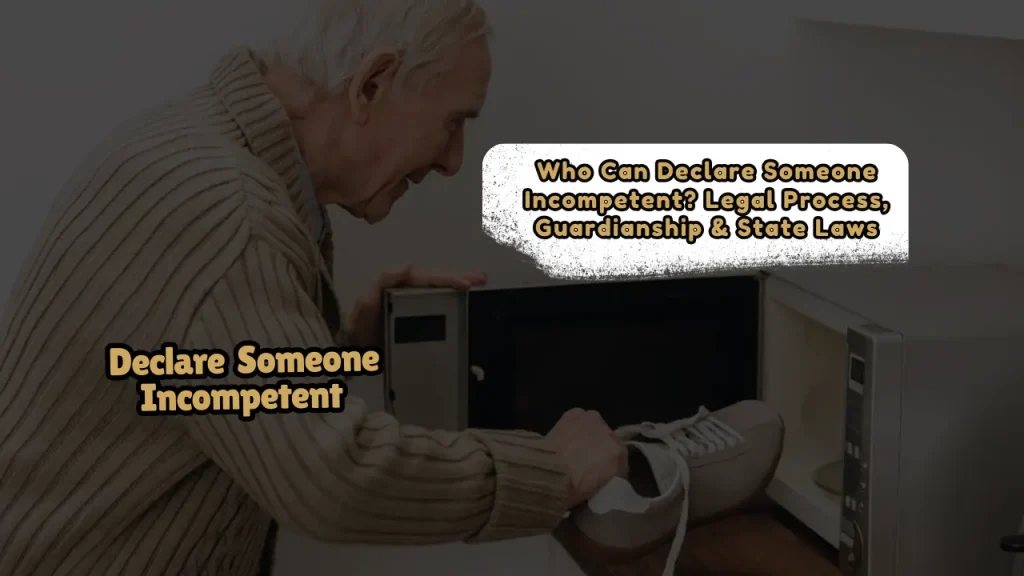Who Can Declare Someone Incompetent? Legal Process, Guardianship & State Laws
In the United States, only a court has the authority to declare someone legally incompetent. However, the process often begins with concerned family members, friends, or caregivers who ask the court to step in. Medical professionals provide critical evidence, but they don’t make the final call—a judge does. Let’s break it all down so you know exactly how it works and what to expect.
Who Can Declare Someone Incompetent?
Only a court can legally declare someone incompetent. Family members, doctors, or social workers can start the process by filing a petition, but the judge makes the official decision after reviewing evidence, often from medical professionals.
Table of Contents
What Does “Incompetent” Mean Legally?
Legally, incompetence (sometimes called incapacity) means a person lacks the mental ability to make sound decisions about their life. This could involve:
- Managing money (e.g., paying bills or avoiding scams)
- Making healthcare choices (e.g., consenting to surgery)
- Handling daily tasks (e.g., eating or dressing)
Conditions Associated with Incompetence
Incompetence is often tied to conditions like:
- Dementia or Alzheimer’s
- Severe mental illness
- Brain injuries
- Developmental disabilities
The National Center for State Courts estimates that over 1.5 million adults are under guardianship in the U.S. due to incompetence. This isn’t about taking away someone’s rights for no reason—it’s about keeping them safe when they can’t do it themselves.
Why It Matters: The Risks of Doing Nothing
If someone’s struggling but hasn’t been declared incompetent, they might:
- Lose their savings to scams (the U.S. Department of Justice says 1 in 10 seniors faces elder abuse, often financial)
- Refuse life-saving treatment
- Endanger themselves or others
A court declaration allows a guardian to step in and protect them.
Who Can Start the Process?
While the court makes the final call, several people can initiate the process by filing a petition:
- Family Members: Spouses, kids, or siblings often take the first step.
- Friends or Caregivers: Close friends or hired caregivers can petition if they’re involved in the person’s life.
- Medical Professionals or Social Workers: Doctors or social workers might file if they see red flags.
- The Person Themselves: In rare cases, someone aware of their own decline can request help.
For example, in California, the California Probate Code Section 1800 lets “any interested person” file for a conservatorship, which covers family, friends, or even the person in question.
Related article for you:
How Long Does It Take to Declare Someone Incompetent in California?

The Role of Medical Professionals: Evidence, Not Authority
Doctors and psychologists are key players, but they don’t declare incompetence themselves. Here’s what they do:
- Perform capacity assessments to test decision-making skills.
- Write reports or affidavits for the court detailing the person’s condition.
Their input is vital, but the judge decides how much weight it carries. Tip: Make sure the doctor’s report is specific—something like “can’t manage finances due to advanced dementia” is stronger than “has memory problems.”
How the Court Decides: The Legal Process
Here’s how the court declares someone incompetent:
- Petition: Someone files a guardianship or conservatorship petition in the probate court where the person lives.
- Notice: The court informs the person and their family, giving them a chance to respond.
- Investigation: A court-appointed expert might evaluate the person’s capacity.
- Hearing: The judge reviews evidence—medical reports, witness statements, financial records—and decides.
The judge needs clear and convincing evidence that the person can’t handle their affairs. In Texas, for instance, the Texas Estates Code Section 1101.101 requires proof of incapacity and a need for protection.
How Long Does It Take?
The process varies:
- Weeks: Emergency cases (e.g., Florida allows temporary guardianship in 10 days).
- Months: Standard cases might take 3-6 months, especially in busy courts like those in New York.
- Longer: Disputes among family can stretch it to 6 months or more.
Can You Challenge It?
Yes! If you think the court got it wrong:
- Appeal: File within a set time (often 30 days) with new evidence or legal mistakes.
- Re-evaluate: If the person improves, ask the court to reconsider.
Appeals are tricky, so get a lawyer involved.
State Differences: It’s Not One-Size-Fits-All
Every state has its own rules:
- California: Calls it “conservatorship” and uses court investigators.
- Florida: Offers guardianship and special options for developmental disabilities.
- Illinois: Needs two doctor reports and favors family guardians.
Check your state’s laws—your local probate court or an attorney can help.
Who Becomes the Guardian?
Once someone’s declared incompetent, the court picks a guardian, usually:
- Family: Spouses or kids are top choices.
- Friends: If family isn’t available.
- Professionals: For complicated cases or family fights.
Guardians must act in the person’s best interest and report to the court.
Takeaway: Act Early, Get Advice
Declaring someone incompetent is a big deal, but it can be a lifeline. It takes time—weeks to months—so don’t delay. Here’s your game plan:
- Get a doctor’s assessment.
- Talk to an elder law attorney.
- File the petition ASAP.
Even better? Encourage your loved ones to sign a durable power of attorney while they’re still sharp—it skips the court drama entirely.
Helpful Resources
- National Guardianship Association: State-specific info.
- American Bar Association – Law and Aging: Legal tools for families.
- Eldercare Locator: Find local help.
About the Author

Sarah Klein, JD, is an experienced estate planning attorney who has helped clients with wills, trusts, powers of attorney, and probate matters. At All About Lawyer, she simplifies complex estate laws so families can protect their assets, plan ahead, and avoid legal headaches during life’s most sensitive moments.
Read more about Sarah
